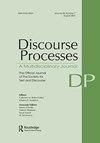Modeling Satirical Uptake Using Discourse Processing Methods
IF 2.1
2区 心理学
Q2 PSYCHOLOGY, EDUCATIONAL
引用次数: 0
Abstract
ABSTRACT Informed by a theoretical model of satirical uptake, this study investigated processing behavior and comprehension of satirical news articles. Reading times for segments of minimally different satirical and non-satirical texts were collected using within-subjects (Experiment 1) and between-subjects (Experiment 2) designs. Segment reading times and participant familiarity with news genres were used to predict ratings of sincerity, humor, and agreement, as well as manually coded comprehension scores for the satirical texts. In both experiments, text perceptions were significantly different for satirical (vs. non-satirical) texts, with some processing differences observed in Experiment 1. Further results from Experiment 1 included no effects for segment reading times on text perceptions or comprehension scores but did include effects for genre familiarity on text perceptions. Experiment 2 results indicated slower reading times were associated with higher perceptions of sincerity and lower chances of satire comprehension, suggesting effortful processing is a marker of failed satirical uptake.用语篇处理方法模拟讽刺接受
摘要本研究采用讽刺吸收理论模型,考察了讽刺新闻文章的加工行为和理解。使用受试者内部(实验1)和受试者之间(实验2)的设计来收集差异最小的讽刺和非讽刺文本片段的阅读时间。分段阅读时间和参与者对新闻类型的熟悉程度被用来预测真诚、幽默和一致性的评分,以及讽刺文本的手动编码理解分数。在两个实验中,讽刺(与非讽刺)文本的文本感知显著不同,在实验1中观察到一些处理差异。实验1的进一步结果不包括分段阅读时间对文本感知或理解分数的影响,但包括类型熟悉度对文本感知的影响。实验2的结果表明,较慢的阅读时间与较高的真诚感和较低的讽刺理解机会有关,这表明努力的处理是讽刺理解失败的标志。
本文章由计算机程序翻译,如有差异,请以英文原文为准。
求助全文
约1分钟内获得全文
求助全文
来源期刊

Discourse Processes
Multiple-
CiteScore
4.30
自引率
4.50%
发文量
27
期刊介绍:
Discourse Processes is a multidisciplinary journal providing a forum for cross-fertilization of ideas from diverse disciplines sharing a common interest in discourse--prose comprehension and recall, dialogue analysis, text grammar construction, computer simulation of natural language, cross-cultural comparisons of communicative competence, or related topics. The problems posed by multisentence contexts and the methods required to investigate them, although not always unique to discourse, are sufficiently distinct so as to require an organized mode of scientific interaction made possible through the journal.
 求助内容:
求助内容: 应助结果提醒方式:
应助结果提醒方式:


